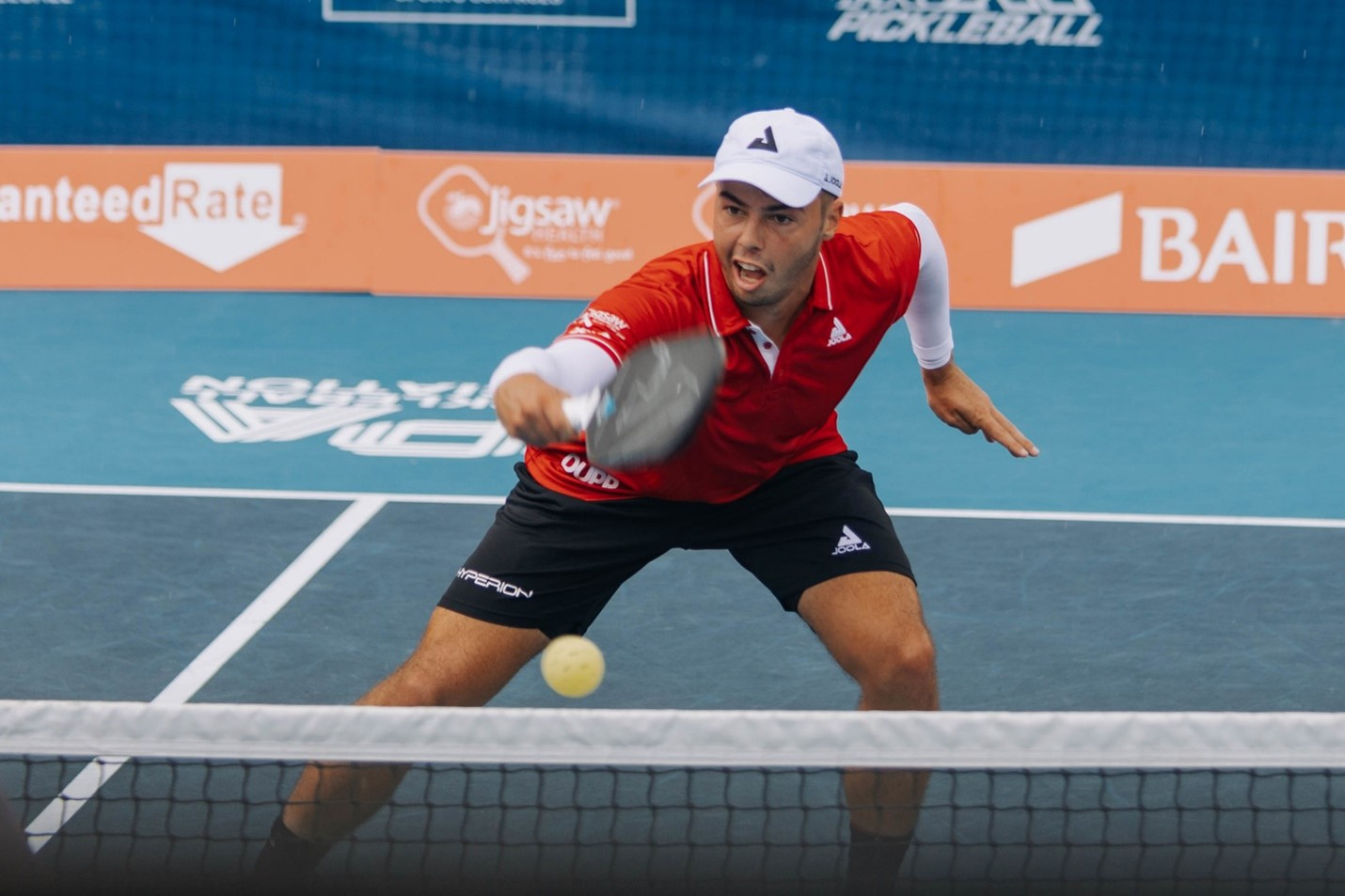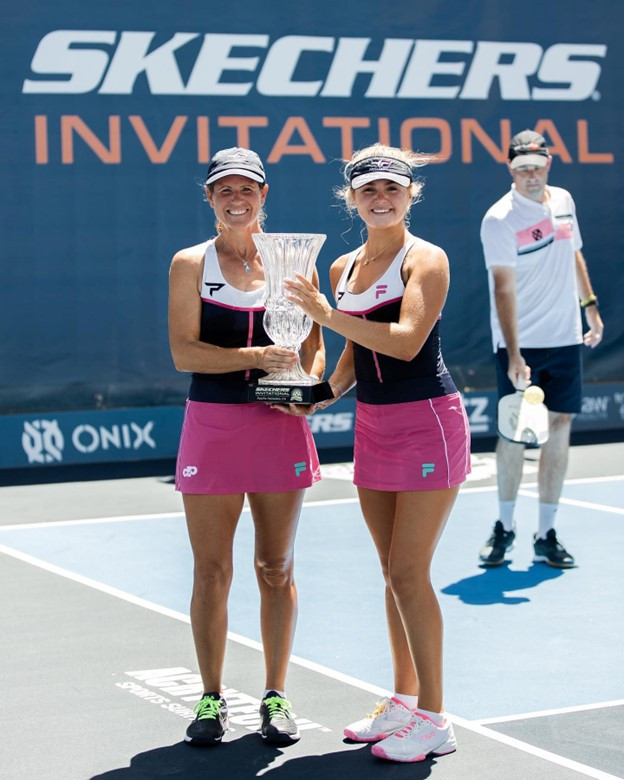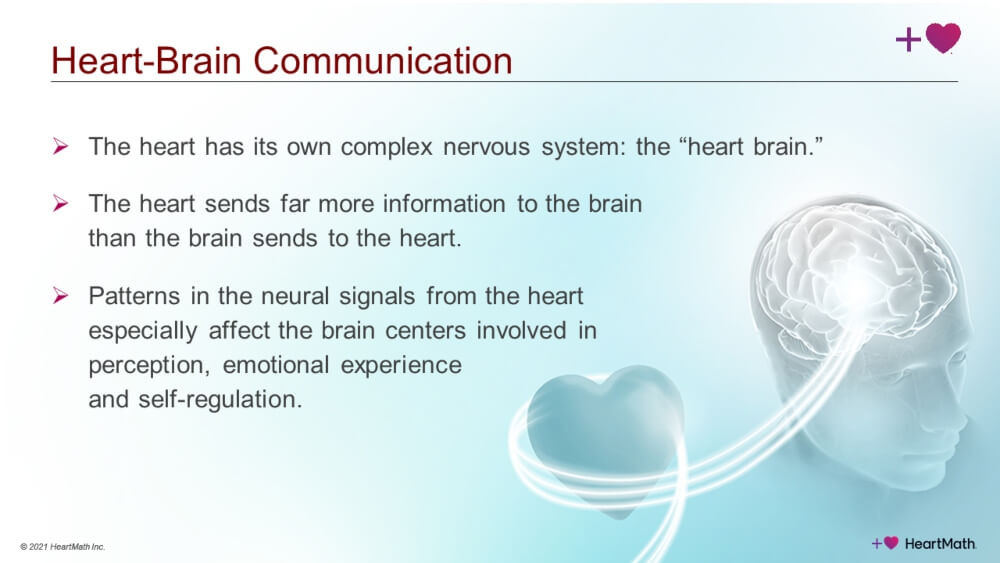Pickleball
Welcome and thanks for visiting...

Mainstream Welcomes Pickleball

Pickleball fans, players, and promoters of the newly popular sport should mentally tattoo August 13, 2022, as the day pickleball entered sports mainstream.
That’s the day CBS Sports provided the first national television network coverage of a pickleball tournament.
For this inveterate sucker for a sports start-up or underdog story, parking in front of the Saturday afternoon inaugural telecast was appointment-watching.
For the 621,000 other viewers who tuned in to CBS's coverage of the Professional Pickleball Association's Summertime Championships, they earned the right to forever brag they were part of the tipping point that muted pickleball fad naysayers.

Ben Johns, Professional Pickleball Association star, hits a backhand volley.
Tipping points have long been a curiosity for me, having witnessed a few.
Though author Malcolm Gladwell did not originate the tipping point, he certainly popularized it in his book by the same name with this description of the instant it occurs:
“The tipping point is that magic moment when an idea, trend, or social behavior crosses a threshold, tips, and spreads like wildfire.”
As an alleged and surely former mini media mogul these eyes were witness to a similar television sports tipping moment.
It was when ESPN aired its first National Football League telecast on November 8, 1987, eight years after turning on its lights and offering sports fans a menu of various sports around the clock.
Best described by ESPN’s football face, Chris Berman, “today we became a network adult,” he said as the NFL relationship triggered a Major League Baseball agreement months later and the point had definitely tipped.
Dare we think CBS’s Pickleball telecast of PPA’s Summertime Championships at California’s renowned Riviera Country Club could be Pickleball’s tipping point?
We do. Those 621,000 mid-summer Saturday afternoon pickleball fans have rolled pickleball over the tipping point’s edge as its growth appears to have morphed from backyard boomer recreation to athletes on a mission to play and entertain.
Take the first set of games that we watched on the Skechers-sponsored PPA Summer Invitational.
A 15-year-old young woman, Anna Leigh Waters became the telecast's superstar, partnering with her mom to win the women’s doubles event against a close rival yet higher ranked and frequent opponents, Lucy Kovalova and Callie Smith.

Insiders are saying the young Miss Walters is clearly asserting herself as pickleball’s number one women’s player coupled with her engaging telegenic presence evidenced as CBS's Camryn Irwyn interviewed the trophy-laden Anna Leigh.
A young, vibrant face like Anna Leigh’s is just what a burgeoning sport needs on TV to boost its already strong growth numbers. It's a pretty good bet Anna Leigh's already on a first-name basis in the pickleball world.
On the men’s side, a rivalry akin to the intensity of a Connors vs. McEnroe match is brewing between number one-ranked Tyson McGuffin and number two-ranked Ben Johns, who won their televised pickleball at Riviera.
A brouhaha spiced up that match when McGuffin was called for a foot fault, giving John his final point in an early game. The referee overruled McGuffin's challenge, but a later video look at the call seems to have supported McGuffin. If nothing else it hyped him and the crowd, but Johns ultimately won this encounter.
All in all, it was a combination of skill, star-quality presence, intense rivalry, and action that made for a good telecast.
As a sports fan, I am pickleball-satiated today and will be hungry for more big-time coverage. Real pickleballers can feed their live-streaming appetites online via the Pickleball Channel.
From a rocking chair, this emeritus producer sprinkles a suggestion to the powers that be regarding big-time telecasts.
There seems to be a rule that rushes play between points or whenever there’s a stoppage, but it is so short that production teams can’t run an instant replay of what just happened.
In professional play or tournaments, the essence of the rule says the server has 10 seconds to call the score, and then once the score is called, the server has 10 seconds to serve.
Those restrictions for telecast producers and commentators to react and provide another look at the preceding action are a problem as CBS’s Brett Haber explained on Saturday’s telecast.
Instant replay is as it infers, instantly available and loses its value and even its importance when aired later, as in time-outs or between games, etc.
When pickleball rules makers get together with their television partners and adapt to the instant time needs of the replay they are apt to fix the only other noticed viewers' problem.
That occurs in high-speed pickleball volleys, especially during doubles matches when the cameras can't seem to capture the image of the ball because it is traveling so fast.
In an allowed true instant replay presented in slow motion, the hardly visible real-time paths of the almost supersonic pickleball volleys will be revealed and quench the curiosity of the wondering viewer.
As tipping points go, CBS’s first national network airing of pickleball won’t compare to the societal impact when much of the world, including sports, shifted from analog to digital, but it sure as heck has pushed pickleball into the mainstream of sports.
So, pickleballers, we got a little tipsy this weekend. The next tipping point is pickleball ticket scalping.








